Thomas E. Ricks's Blog, page 192
March 27, 2012
Should the Army be more like the Navy in holding its commanders accountable?
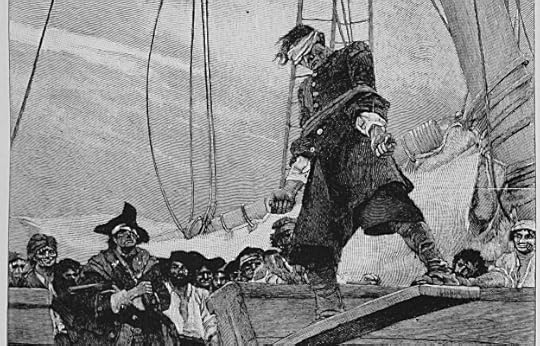
By Joe Doty
Best Defense department of command
responsibility
How do we explain the huge disparity between the large number
of Navy Commanders getting fired (more
than 30 in 2011) and the relatively small number of Army Commanders getting
fired?
It seems like every month or so another Navy Skipper or XO
is being relieved. Last year two Army
brigade commanders were removed from command in Germany, a battalion commander
was relieved in Afghanistan, and a few years back an Army Division Commander
who commanded in Baghdad was "asked" to retire due to command climate
issues. Also, a Cav Squadron commander
was relieved in the mid-1990s. But this clearly is not the norm in the
Army.
Is there really a significant difference between the two
services and the way they conduct business/command/leadership?
We all know it is part of the culture in the Navy that "if
the ship runs aground, it is the Captain's responsibility"; or "the Captain is
always responsible, even if he/she isn't."
Clearly these are not just words in the Navy -- they back it up. Many skippers have been relieved of command
(USS John L. Hall, 2010; USS Hartford 2009; USS San Francisco, 2005; aircraft
carrier USS John F. Kennedy, 2004) for collisions or groundings. Being relieved under these circumstances is
the norm in the Navy, part of the professional ethic. Navy ship and submarine commanders have an expectation they will be (and should be)
relieved of their duties when something "really bad" occurs on their
watch. This expectation is different
than a performance or behavior standard.
In the Army, there is an old saying that "the commander is
responsible for everything the unit does and/or fails to do." But are they accountable? Historically, the Army does not relieve commanders at
the 05/06 level at even close to the rate the Navy does, and maybe it shouldn't. Or
maybe the Navy is too quick to relieve ship commanders -- especially "unlucky"
ones. However, for the Army to maintain
a healthy professional ethic, commanders need to embrace the spirit of this quote -- as their command responsibility. And, the senior leadership in the Army should
consider how they hold commanders accountable
for what their units and soldiers do and/or fail to do.
There are a few common and unwritten themes on this topic:
1. A commander can
delegate authority, but not responsibility. Authority refers to "who is in charge" while responsibility refers to
"who is accountable."
2. A commander is
responsible but very often not in
control.
3. Commanders have a
responsibility to ensure their subordinates are trained and can operate
independently based on the commander's intent.
4. Commanders have a
responsibility to set a command climate wherein subordinates will act ethically
in the absence of leaders.
Thoughts?
Joe
Doty, PhD, is a retired Army officer currently working as a leadership and
ethics consultant. For more on this topic please see his
article on "Command responsibility and accountability"
in the Jan/Feb 2012 issue of Military
Review.
March 26, 2012
Comment of the day: Military docs, do better dealing with my lost testicles
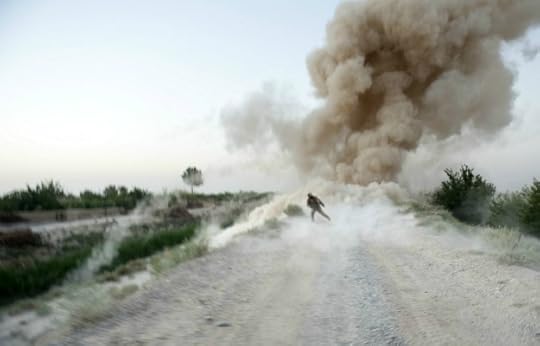
In case you
didn't see this
last week, from "LeftmylegsinAfghanistan":
I'm an infantry PL that lost both legs
above the knees and both testicles while chasing ghosts in the Arghandab.
I've spent just about three years
undergoing rehab and training with prosthetics and I will be the first to
applaud the level of care that I've received from the Army and from Walter
Reed, but I will also be the first to tell you that WR's great care comes to an
abrupt halt with regard to genital wounds and reproductive issues. While my
limbs have received a tremendous level of attention, my infertility has never
once been addressed. Early in my recovery a urologist prescribed me a testosterone
replacement medication, but no one even brought up the fact that the urologist
was woefully ill-equipped to deal with what is mostly an endocrinologist's
issue.
In my experience, no one in the
military's medical system wants to address this issue. Some of our guys have
testicles, or pieces of their testicles, that make it back to the CSH at Bagram
or KAF, but there is no procedure for harvesting and freezing sperm or tissue
that could be used for fertility treatments in the future. There are methods
for this (utilized most commonly prior to chemotherapy treatments), but as the
article mentioned, the military medical system will not even cover IVF for
couples that cannot conceive as a result of a service member's combat injuries.
There is no effort to improve this
situation. I applaud David
Wood for bringing this issue to the surface, but I'm afraid that the
attention this generates, as almost always, will be brief.
Canadian navy fires another CO
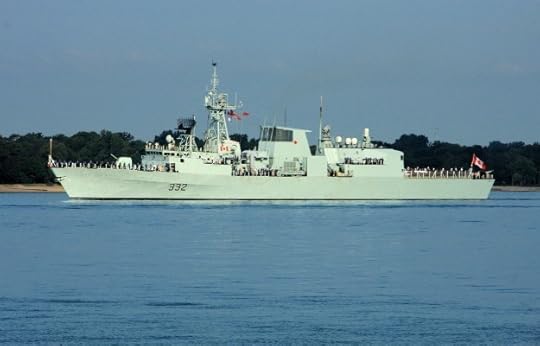
The 2nd
of the year -- both booted for banging
their ships into things.
I wonder if the
situation in Canada is like here, where the nautical forces have retained
traditions of accountability that are now a distant memory for most of the
ground forces.
(HT to AO)
Party down with the big thinkers, get the skinny on the policies of tomorrow

Do it all at
CNAS's annual Woodstock for policy wonkers. It will be on June 13 in DC.
If you haven't
seen Brzezinski and Scowcroft do their breakdancing routine, you haven't lived.
Bust them moves.
New commenting program for Best D.
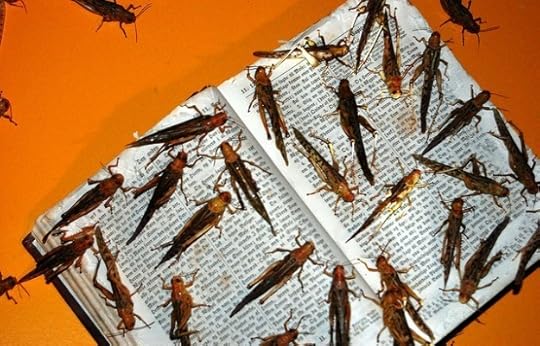
In response to your many complaints about the screwy
commenting software Foreign Policy uses,
the computer dweebs have gotten a different system. They assure me it will work
better.
Apparently two of the ways to comment are using Facebook or
Twitter. There is a third way, that I recommend: I don't do any social networks, and I think there are enough twits
in the world, so I will use Livefyre, which they tell me preserves anonymity if
so desired, which I think many of you do.
Let me know how it works for you. And, as always, remember rule 2: Don't post
comments while drunk.
March 23, 2012
How about a presidential medal of freedom for General Antonio Taguba?

One thing the Army does not
do so well is reward its people who do some of its toughest jobs -- investigating
the lapses of the institution.
Yesterday I watched this interview
General Taguba gave to West Point's oral history project. It has some
interesting tidbits. When he tried to catch up with Brig. Gen. Janis Karpinski
to interview her for his investigation
of detainee abuse and torture (that was his conclusion, he says) at Abu
Ghraib, he said, "She was trying to leave the country." (I think the country in question was Kuwait.)
His overall conclusion was
that Abu Ghraib "was a systemic failure of leadership at the tactical level,"
with major lapses committed by the staff of Lt. Gen. Ricardo Sanchez. "You had
a very ambigious chain of command . . . I said, 'Jeez, doesn't anyone ever
follow doctrine around here?" (This had to do with who should be overseeing
detainee operations -- intelligence, MPs, or operations.)
When he briefed Defense
Secretary Rumsfeld on the report in May 2004, he said, "he wasn't even remotely
interested" in the findings of the report, and seemed to focus more on who had
leaked it. He says he doesn't know for sure, but suspects that Douglas Feith, the
under secretary of Defense for policy, suggested to the Army that Taguba be
retired.
Taguba's
bottom line: "The only institution that actually paid the price was the U.S.
Army, and the rest of the military." The Bush administration officials who
promulgated "a horrific set of policies" got off scot-free.
I think a presidential
medal of freedom for Taguba, who did the hard right thing to do instead of the
easy wrong thing to do, is the right thing to do. I also think it might balance
the ones wrongly given to Tommy
R. Franks and George Tenet.
Quote of the day: General Allen on the success of night ops in Afghanistan
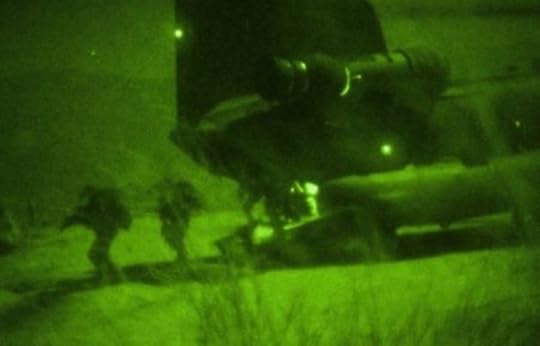
Here is an excerpt from the testimony yesterday of Gen. John
Allen, the U.S. commander in Afghanistan, to the Senate Armed Services
Committee:
This last year we had about 2,200 night
operations. Of those 2,200 or so night
operations, in 90 percent of them we didn't fire a shot. On more than 50 percent of them, we got the
targeted individual, and in 30 percent more we got the next associate of that
individual as well. So 83 percent,
roughly, of the night operations we got either the primary target or an
associate.
In all of those night operations, even with
10 percent where we fired a shot, there was less than 1.5 percent civilian
casualties. Now, I don't diminish any civilian casualties by reducing it to a
percentage point. Every one of those is tragic. But after 9,200 night operations, 27 -- 27 -- people were killed or wounded
in night operations. That would argue
for the power of night operations preserving life and reducing civilian
casualties in all other kinds of operation than necessarily being a risk of
creating additional civilian casualties. That's in my mind, sir, as we go through the
process of negotiating an outcome for the Afghanization, if you will, of
night operations.
Rebecca's War Dog of the Week: Friday photo from Patrol Base Habib
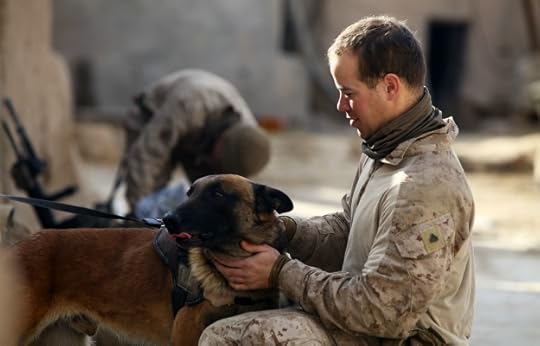
By Rebecca Frankel
Best Defense Chief Canine Correspondent
Here's a photo
selection from the war-dog road, we'll go back to regular
programming with next week's post.
In the above photo, Cpl. Javier Gandia,
gives MWD TTroy some love.
'I'm just a dog
lover, TTroy is a great dog,' says
Cpl. Javier Gandia, 22, fire team leader, from San Juan, Puerto Rico. 'It's
cool to be deployed and still play with a dog.'
'The Marines are very
pleased with my dog, TTroy," said Cpl. Derrick Magee, 21, TTroy's handler. "He
helps keep us alive and I keep him happy...'"
Rebecca Frankel, on leave from her FP desk, is currently working on a book about military working dogs to be published by Free Press.
March 22, 2012
Most painful story of the day: My genitals were torn off by a bomb in Afghanistan
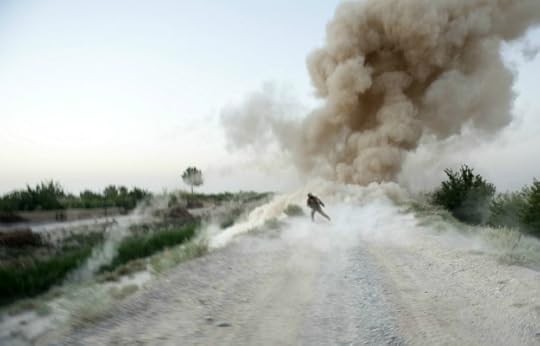
David Wood talks
to Marines whose genitals
have been severed or mangled by bombs. Impossible to read without wincing.
As a former reporter, I am impressed by Wood's ability to get people to
talk-and to relate their stories clearly and candidly.
McDonough's 'Platoon Leader' (III): On the dead, the nature of war, and why the U.S. could never win the Vietnam War
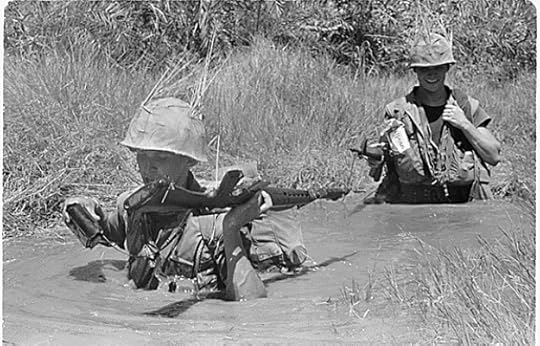
McDonough
is a good observer
of war, as you may have sensed
by now. Here are a few of the other things that struck me in his book Platoon
Leader.
--On the dead
after a firefight: "A corpse immediately takes on an appearance of loosely
packed earth piled into oversized clothes."
--His
deceptively simple summary of the whole event: "War is the suffering and death
of people you know, set against a background of the suffering and death of
people you do not."
--He also is a
critical observer of his own changes: "I could no longer draw a distinction
between the war and my presence in it. . . The war had become a part of me,
and I a part of it. And though my recognition of that fact was unnerving, I
knew that probably within my transition lay the seeds of my ultimate survival."
--Pausing to
catch his breath on Thanksgiving Day: "We could mourn the dead, but we could
not dwell on them; we had to look after ourselves."
--Finally, his
bottom line on the Vietnam War, after the Communists wipe out the village it
was his mission to protect: "Like the entire American system in Vietnam, we had
fought a limited military war with constrained objectives; the enemy had fought
a total political war with no preordained restrictions. We were doomed from the
outset."
Thomas E. Ricks's Blog
- Thomas E. Ricks's profile
- 436 followers



